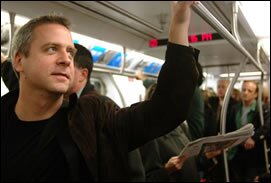Violinist Augustin Hadelich Delivers “Extraordinary Performance” at Seattle’s Chamber Music Festival

The second week of Seattle Chamber Music Society’s Summer Festival wrapped up Friday night with half the performance being two-piano works, and the other half string octets, one of each being classical, one of each being 20th century, a good study in contrasts.
But first, the recital. This year, these free half-hours by one or two musicians introducing and performing their own choices have been some of the most absorbing performances of the evening, and Friday’s was no exception. It featured violinist Augustin Hadelich and pianist Orion Weiss in Stravinsky’s Divertimento for Violin and Piano, followed by Tchaikovsky’s Valse-Scherzo, Op. 34, not played here before.
On the face of it, this seems straightforward, but in his comments Hadelich announced this was a frivolous program, explaining that Stravinsky transcribed various works by Tchaikovsky to create a ballet, The Fairy’s Kiss, and in the process mischievously “Stravinskified” the Tchaikovsky. He and Weiss were about to perform first the Stravinsky version of one work, complete with “mistakes” where the performers get apparently out of sync before trying to recover, and then the original Tchaikovsky from which it was taken.
It was an extraordinary performance by both but particularly Hadelich who tossed off the difficult technical aspects with lightness and ease while maintaining the delight and fun in these works. Where else could we hear such a coupling, together with an explanation, and performed by two consummate artists who were completely in tune with each other and the music?
In the ensuing concert, Festival newcomer Inon Barnatan and Adam Neiman played Mozart’s Sonata for Two Pianos in D Major, K. 488, in a spirited, elegant performance absolutely together.

Sounding less rehearsed, less insightful than one would expect from these two pianists, and not always quite together, pianists Jeremy Denk and Weiss gave a work new to the Festival, Debussy’s 1915 En blanc et noir.
According to the composer it was intended to be abstract, but the first, fast-moving, angry movement and the second dedicated to a friend killed in the war, are fierce indictments of war with trumpet-like blasts and interpolations of Luther’s hymn “Ein’ feste burg.” The last movement, dedicated to Stravinsky, has inklings of the aftermath of war. The performance brought out many of the moods which ebb and flow throughout, both gentle and forceful, the lugubrious start to the second movement with its elegiac moments and the quickfooted final one.
Shostakovich is normally the composer we associate with musical thoughts on war and its ravages, but his Two Pieces for String Octet, Op. 11, are more straightforward. He was eighteen when he composed the Prelude on the death of a close friend from typhoid, and a year later added a Scherzo as a companion piece. The performance, by violinists Hadelich, Ida Levin, Stephen Rose and Benjmin Beilman (another festival newcomer), violists Cynthia Phelps and Richard O’Neill, and cellists Ronald Thomas and Bion Tsang, brought out the declamatory and dirge-like nature of the Prelude and its eventual resolution toward some sort of peace, while the players gave the Scherzo its darker, frenetic side, vigorous, discordant, disturbing, and screechy.
The same group went on to play a work from just a century earlier but light years away in temperament: Mendelssohn’s String Octet, an amazing accomplishment for a sixteen-year-old. While the performers led by Hadelich achieved many moments of glorious songfulness, particularly in the dancing, quicksilver third movement, whenever the music reached a forte, they sounded too forceful for the music, turning the tone a bit ugly, particularly in the highest register.
